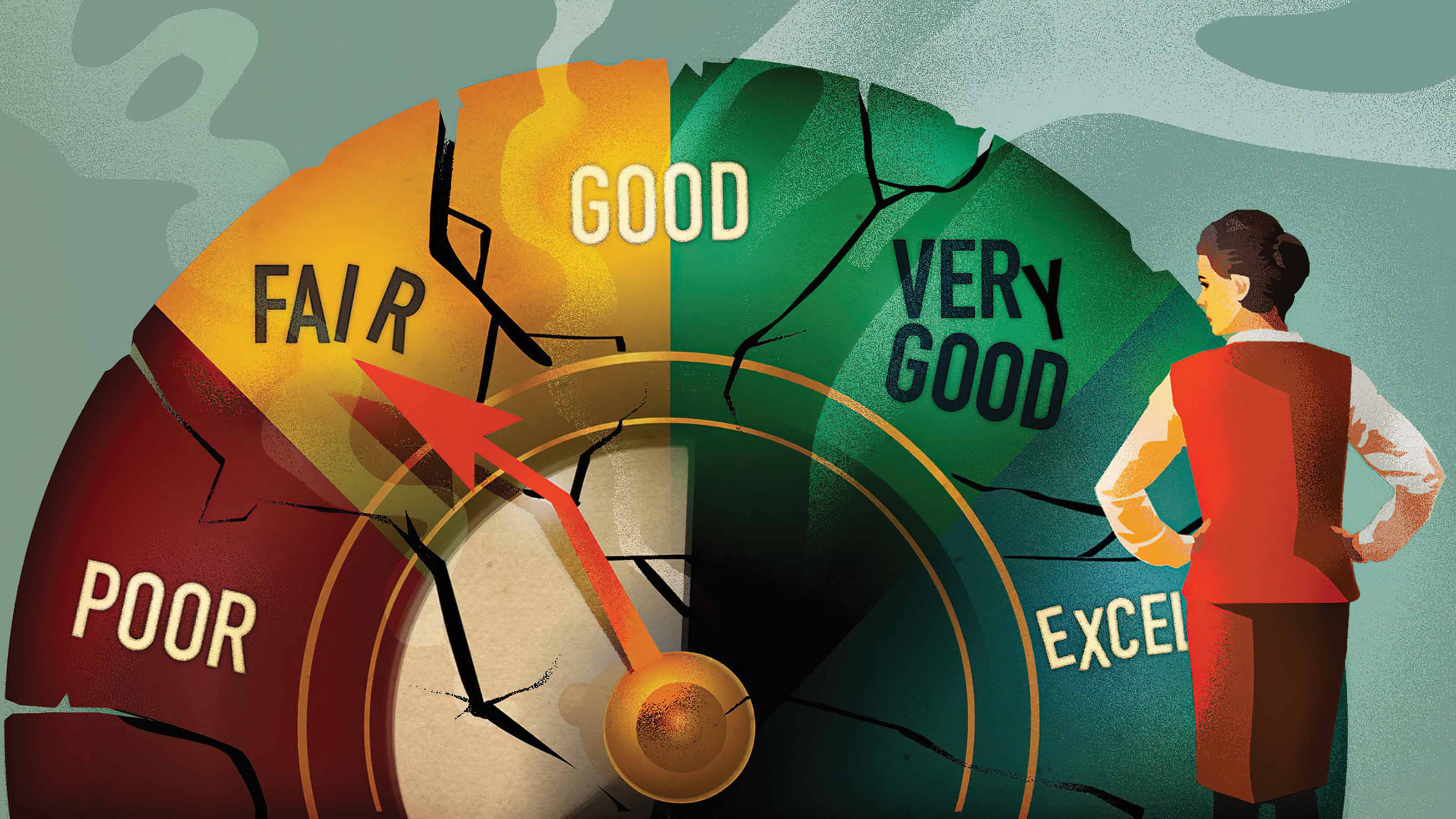What Being an "Authorized User" Does to Your Credit Score
An adult child's credit score may dip–or even rise–after he or she is removed as an authorized user of a parent's credit card.


Profit and prosper with the best of Kiplinger's advice on investing, taxes, retirement, personal finance and much more. Delivered daily. Enter your email in the box and click Sign Me Up.
You are now subscribed
Your newsletter sign-up was successful
Want to add more newsletters?

Delivered daily
Kiplinger Today
Profit and prosper with the best of Kiplinger's advice on investing, taxes, retirement, personal finance and much more delivered daily. Smart money moves start here.

Sent five days a week
Kiplinger A Step Ahead
Get practical help to make better financial decisions in your everyday life, from spending to savings on top deals.

Delivered daily
Kiplinger Closing Bell
Get today's biggest financial and investing headlines delivered to your inbox every day the U.S. stock market is open.

Sent twice a week
Kiplinger Adviser Intel
Financial pros across the country share best practices and fresh tactics to preserve and grow your wealth.

Delivered weekly
Kiplinger Tax Tips
Trim your federal and state tax bills with practical tax-planning and tax-cutting strategies.

Sent twice a week
Kiplinger Retirement Tips
Your twice-a-week guide to planning and enjoying a financially secure and richly rewarding retirement

Sent bimonthly.
Kiplinger Adviser Angle
Insights for advisers, wealth managers and other financial professionals.

Sent twice a week
Kiplinger Investing Weekly
Your twice-a-week roundup of promising stocks, funds, companies and industries you should consider, ones you should avoid, and why.

Sent weekly for six weeks
Kiplinger Invest for Retirement
Your step-by-step six-part series on how to invest for retirement, from devising a successful strategy to exactly which investments to choose.
Question: Years ago, my parents made me an authorized user on one of their credit cards. I have my own cards now, and they are removing me from their account. Will this affect my credit score?
Answer: It can, but maybe not much if you’re smartly managing your own cards. “You might see a bit of a dip in your score because there’s been a significant change. But if you’ve established a strong credit history otherwise, that score will rebound,” says Rod Griffin, director of public education for credit bureau Experian. If your parents’ card has a high balance relative to its limit or a record of late payments, then being removed as an authorized user could even give your credit score a lift.
One important consideration: The credit line on your parents’ card should no longer factor into your utilization ratio, which is the amount you owe on your cards as a percentage of available credit. FICO includes utilization in its “amounts owed” category, and it makes up 30% of your credit score. The lower the utilization ratio, the better for your score. For example, if your credit limits total $25,000 while you’re an authorized user, your parents’ card has a $500 balance and your own cards have $4,500 in total balances, your overall utilization ratio would be 20%. But if your available credit falls to $10,000 after you’re dropped from your parent’s account, your utilization ratio rises to 45%.
From just $107.88 $24.99 for Kiplinger Personal Finance
Become a smarter, better informed investor. Subscribe from just $107.88 $24.99, plus get up to 4 Special Issues

Sign up for Kiplinger’s Free Newsletters
Profit and prosper with the best of expert advice on investing, taxes, retirement, personal finance and more - straight to your e-mail.
Profit and prosper with the best of expert advice - straight to your e-mail.
Utilization is calculated for individual cards as well as in the aggregate for all your accounts. Aim to use no more than 20% to 30% of your limit on each card to maintain a healthy score. Those with excellent FICO scores of 800 or higher use an average 7% of their available credit, according to FICO.
After an authorized user is removed from a credit card, the account usually disappears from the user’s credit report, says credit expert John Ulzheimer, formerly of FICO and credit bureau Equifax. If that’s the case, the age of your parents’ account will no longer be a factor in your credit score. Length of credit history counts for 15% of a FICO score, so if your other credit accounts are newer than your parents’ account, your score may drop a bit.
It’s possible that your parents’ card account will remain on your credit report but no longer be updated by the issuer. In that case, the account’s age will still be considered in your credit score (but utilization won’t). If you want to see whether an account still shows up on your report, go to www.annualcreditreport.com, where you can get a free report from each of the major bureaus—Equifax, Experian and TransUnion—every 12 months.
Profit and prosper with the best of Kiplinger's advice on investing, taxes, retirement, personal finance and much more. Delivered daily. Enter your email in the box and click Sign Me Up.

Lisa has been the editor of Kiplinger Personal Finance since June 2023. Previously, she spent more than a decade reporting and writing for the magazine on a variety of topics, including credit, banking and retirement. She has shared her expertise as a guest on the Today Show, CNN, Fox, NPR, Cheddar and many other media outlets around the nation. Lisa graduated from Ball State University and received the school’s “Graduate of the Last Decade” award in 2014. A military spouse, she has moved around the U.S. and currently lives in the Philadelphia area with her husband and two sons.
-
 Betting on Super Bowl 2026? New IRS Tax Changes Could Cost You
Betting on Super Bowl 2026? New IRS Tax Changes Could Cost YouTaxable Income When Super Bowl LX hype fades, some fans may be surprised to learn that sports betting tax rules have shifted.
-
 How Much It Costs to Host a Super Bowl Party in 2026
How Much It Costs to Host a Super Bowl Party in 2026Hosting a Super Bowl party in 2026 could cost you. Here's a breakdown of food, drink and entertainment costs — plus ways to save.
-
 3 Reasons to Use a 5-Year CD As You Approach Retirement
3 Reasons to Use a 5-Year CD As You Approach RetirementA five-year CD can help you reach other milestones as you approach retirement.
-
 How Many Credit Cards Should I Have?
How Many Credit Cards Should I Have?How many credit cards should you have? The answer isn’t as straightforward as you might think — it all depends on your financial situation.
-
 What Is a Good Credit Score?
What Is a Good Credit Score?Having a good credit score can save you hundreds, even thousands of dollars on credit cards, mortgages and other loans.
-
 Best Credit Cards for Bad Credit 2023
Best Credit Cards for Bad Credit 2023If used wisely, these credit cards can help you dig out of bad credit; you may even earn 2% cash back.
-
 How to Freeze Your Credit in Three Steps
How to Freeze Your Credit in Three Stepscredit & debt Freezing your accounts at the three major credit bureaus is the best way to prevent thieves from opening new credit accounts in your name.
-
 Two Updates to Credit Reports
Two Updates to Credit Reportscredit & debt The major credit bureaus are changing how they report information about medical debt and buy now, pay later.
-
 Free Credit Monitoring for Equifax Breach Victims
Free Credit Monitoring for Equifax Breach Victimscredit reports Millions of consumers whose data may have been exposed have been notified to sign up for the monitoring service.
-
 What Does Your Credit Score Really Mean?
What Does Your Credit Score Really Mean?Basics Your score helps lenders assess the likelihood you’ll repay a loan. It can also help you assess your credit health.
-
 How to Fix Your Credit Reports
How to Fix Your Credit ReportsCoronavirus and Your Money Before you apply for a mortgage or car loan, check your credit files for errors that could derail your plans.